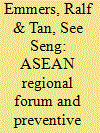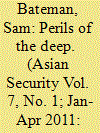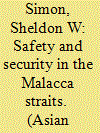|
|
|
Sort Order |
|
|
|
Items / Page
|
|
|
|
|
|
|
| Srl | Item |
| 1 |
ID:
103586


|
|
|
|
|
| Publication |
2011.
|
| Summary/Abstract |
Various reasons purport to explain why the Association of Southeast Asian Nations Regional Forum (ARF) has failed to evolve from confidence building to preventive diplomacy (PD). These include the ARF's large membership, its strict adherence to sovereignty and noninterference principles that contradict any effective implementation of PD, and contrasting strategic perspectives among its participants. Although these factors have certainly hindered security cooperation, none are sufficient conditions by themselves to explain the forum's ambivalence toward PD. The authors argue that these factors do not tell the whole story, not least when they have not stood in the way of experiments in PD by other processes in the Asia-Pacific. The claim here is that the ARF has evolved into a highly inflexible forum, which in turn has led to the formalization of its approach to PD. This has severely inhibited the adoption of a PD agenda and actionable measures under the ARF framework.
|
|
|
|
|
|
|
|
|
|
|
|
|
|
|
|
| 2 |
ID:
103587


|
|
|
|
|
| Publication |
2011.
|
| Summary/Abstract |
Greater numbers of submarines are being acquired in the Asia-Pacific. This development poses challenges in the region for preventive diplomacy, maritime confidence building, and ensuring the safety of submarine operations. However, countries are extremely sensitive about submarine operations and meeting these challenges will be difficult. The article discusses technological developments with submarines and antisubmarine warfare and the implications for regional naval operations. It identifies the risks associated with increased numbers of submarines, particularly in the narrow seas of East Asia, and recommends measures that might mitigate the adverse consequences of submarine proliferation, including enhancing submarine safety. It concludes that there is a pressing need to start discussion of these measures in regional forums.
|
|
|
|
|
|
|
|
|
|
|
|
|
|
|
|
| 3 |
ID:
103585


|
|
|
|
|
| Publication |
2011.
|
| Summary/Abstract |
The Malacca Straits are arguably the world's busiest and most important waterways. An estimated 25 to 40 percent of all trade passes through them each year, including significant amounts of global oil supplies and other natural resources. Increased vulnerability of shipments through the area, from such causes as piracy and armed robbery to navigational and safety concerns, prompted littoral and user states to mount a series of initiatives that helped significantly bolster ship security in the region over the last several years. User states are providing financial and technical assistance to the littoral states, but that assistance has been largely bilateral, with some new collaboration among the participants suggesting a multilateral approach to enhancing safety and security. However, questions remain about the sustainability of these programs, additional needs and opportunities, and the lessons they may offer for enhancing safety and security in other regions. For the Malacca Straits states, continued resistance to sovereignty infringements persist even though they remain dependent on financial and other assistance from user states for many of their security needs.
|
|
|
|
|
|
|
|
|
|
|
|
|
|
|
|
| 4 |
ID:
103582


|
|
|
|
|
| Publication |
2011.
|
| Summary/Abstract |
During the Cambodian Civil War (1970-75), the Khmer Rouge, whose ideological appeal had a significant effect on its recruitment of combatants, flourished and was able to maintain influence over the Cambodian population. The Lon Nol government, to a certain extent, also succeeded in recruiting combatants, and many civilians joined the government army. Focusing on the structural contexts of three districts in Battambang province during the war, this article seeks to explain these contradicting facts by taking into greater account the role of territorial control in the recruitment of combatants. Although both sides relied not only on the noncoercive mobilization of combatants but on coercive measures within their designated zones of control, they were forced to search for highly motivated volunteers within their opponent's zones.
|
|
|
|
|
|
|
|
|
|
|
|
|
|
|
|
|
|
|
|
|